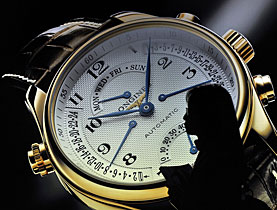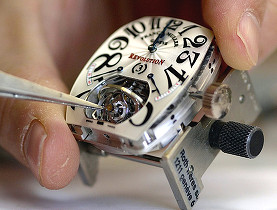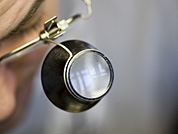Crisis forces watch industry to “reset” values

As the doors open to Baselworld 2009, the biggest event of the watchmaking calendar, organisers of the show are upbeat about the industry's outlook.
François Thiébaud, president of the Swiss exhibitors committee, tells swissinfo the industry will start to recover from the effects of the global financial crisis as of May and the general feeling of pessimism will subside.
The industry will “reset” its watches as it returns to traditional values, he says. The sector is currently experiencing its first slowdown after five years of record growth.
Baselworld 2009 is the world’s leading showcase for watches and jewellery. It was opened by Interior Minister Pascal Couchepin on Thursday.
swissinfo: The world is suffering under the global financial crisis. What’s ailing the watch industry?
François Thiébaud: It’s certainly not an incurable disease. The watch sector has been affected by the world financial crisis, but it’s more a crisis of confidence. People don’t have any cash, bank credit is blocked, and as the media tend to relay the morose climate, clients are delaying with their purchases.
The Swatch Group, to which I belong, has numerous shops around the world. We are seeing that consumer spending hasn’t stopped, even if unfortunately there has been an increase in unemployment. But with the G20 countries about to meet in London there are some signs of recovery. I hope the engine will be able to restart quickly.
swissinfo: You are confident about the future, that there will be talk of “after the crisis”…
F.T.: This is definitely the biggest crisis the world has faced since the 1930s, but that means than attitudes are going to change. We are going to return to the true value of things. We’ll move away from the extravagances of the past few years. Notably with regard to prices. We will head more toward real values, toward watchmaking traditions and the development of artisanal work. We are going to reset our watches.
swissinfo: In which regions of the world has this industry been most affected?
F.T.: It is especially in the Americas, north and south, and in the United States in particular, where we are noticing orders drop by 20, 30, even 60 per cent. A lot of businesses are going bankrupt. In Europe, Spain in particular has been hit over the past year because of the property market. On the other hand, the Arab countries remain stable.
There is also talk of a property crisis in the United Arab Emirates but the hotels are full for the coming Easter holidays. There are fewer Russian tourists and the shops are less busy but, as far as we are concerned, sales are comparable to the previous year. In Asia, Japan is the country most affected. China, on the other hand, this year expects growth of eight per cent.
swissinfo: The turnover figures being cited by the watchmaking industry, a drop of 22.4 per cent in February 2009 compared with 2008, are misleading because they relate to exports and not necessarily sales. What about stock?
F.T.: It’s true that the export figures mentioned do not mean that these watches were sold. These watches were exported from Switzerland but are they just sitting with wholesalers, distributors or in retail outlets? Are these watches reaching the end customer? We do not know.
But I think the sharp decline recorded as of October 2008 means that stocks are running low. Figures for March show that we are on the way up again and that May and June should show a recovery. It will not be impressive, but I think the pessimism should begin to subside in the months ahead.
swissinfo: Baselworld is a good barometer of the status of the watchmaking industry. The number of exhibitors has increased – 40 companies have invested in new stands – and the jewellery industry had few cancellations.
F.T.: The number of visitors and journalists who will visit the show by April 2 should give us some other clues. The watchmaking industry is at the heart of the luxury market, a sector hit directly by the crisis. The press will be able to observe trends. If the media perceives a sign of recovery, it will send a fantastic signal to the entire industry.
swissinfo: Will the crisis in the watchmaking industry lead to cutbacks in the promotion of sport through sponsorship?
F.T.: So far the brands that I represent have not reduced any budgets, even if it is true that the time is not conducive for making new commitments. On the one hand, we have signed binding contracts. On the other hand, [stopping sponsorship] would send a negative signal to the public.
Instead savings should be made on purchase costs, travel and representation. Today it is necessary to protect know-how and personnel, not to rush into redundancies.
swissinfo: What about the so-called “grey market”, the distribution of products through unofficial channels. Are you equipped to fight this scourge?
F.T.: When everything is going well, parallel imports are also good. So when things do not go as well, the grey market should also be losing steam. But it is true that some retailers will try to resell goods at considerable discounts. If one market is underperforming, a distributor could be tempted to sell his stock at slashed prices.
This phenomenon has caused the rot to set in with some brands. But there are distribution contracts that guarantee the monitoring of products and after-sales service. Stepping outside the regular circuit involves risk, for the customer as well. Stocking up via the grey market or buying fakes contributes to the destabilisation of the economy.
It is better to work with people who earn an honest living than to support criminals, those who exploit children or employers who do not have social safety net. We must focus on quality and the Swiss label.
swissinfo-interview: Olivier Grivat in Basel
Baselworld 2009 focuses on watches, jewellery and related offshoots. It runs from March 26 to April 2 in Basel in northwestern Switzerland.
It was born out of the Basel Fair of Swiss Samples where the watch and jewellery sector was created in 1917.
This trade fair, the largest held in Switzerland, brings together 1,952 exhibitors from 45 countries (compared to 2,087 in 2008).
The 359 watch manufacturers take up around two-thirds of the 160,000 m2 exhibition halls.
95% of the Swiss watch producers are represented there.
Two-thirds of the exhibitors are from Europe and a quarter are from Asia.
The 2008 show attracted 106,000 visitors from over 100 countries and nearly 3,000 journalists.
The next show is planned for March 18-25, 2010.
The watchmaking sector is Switzerland’s third-biggest export industry. It reported declines in export figures in January and February.
In the US, its second biggest market, and Japan (fifth), exports fell by 47.5% and 13.3%. Europe and Asia reported declines of less than 10%.
The Swiss watch industry employed nearly 50,000 people before the crisis. But an estimated 1,000 have since lost their jobs. Brands such as Roger Dubuis, Ebel, Girard-Perregaux and Zenith have already made cutbacks.
Some companies have introduced short-time working in order to cushion the effects of the financial crisis and in an attempt to avoid redundancies.

In compliance with the JTI standards
More: SWI swissinfo.ch certified by the Journalism Trust Initiative












You can find an overview of ongoing debates with our journalists here . Please join us!
If you want to start a conversation about a topic raised in this article or want to report factual errors, email us at english@swissinfo.ch.